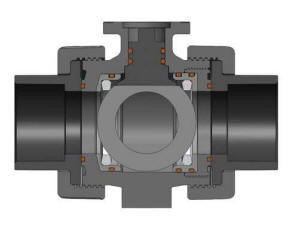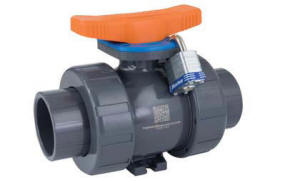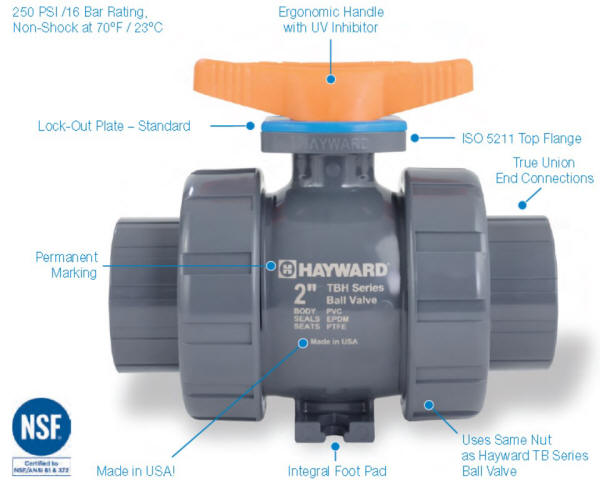Introducing the Hayward TBH Series Ball Valve
System2™ sealing, an evolution of non-alloy ball valve design
Hayward's new TBH true union ball valve design with System2™
sealing technology is an evolutionary redesign of their TB series ball
valve. This new, thoughtful and patented valve design enhances
usability while solving elusive problems that plague all other non-alloy
valves.
System2™ Sealing Technology
 Traditional
ball valves have what is referred to as a "floating" ball design, which
refers to the ball within being sealed between a pair of "seats" made of
Teflon. During the life of the valve the seats may wear due to frequent use
or aggressive media, requiring a physical adjustment to keep the seats
against the ball. One problematic aspect with adjustments is it often
requires a special tool and it directly affects the shaft torque; if the
valve is actuated, it is critical to avoid "over-adjustment" otherwise the
actuator will not function.
Traditional
ball valves have what is referred to as a "floating" ball design, which
refers to the ball within being sealed between a pair of "seats" made of
Teflon. During the life of the valve the seats may wear due to frequent use
or aggressive media, requiring a physical adjustment to keep the seats
against the ball. One problematic aspect with adjustments is it often
requires a special tool and it directly affects the shaft torque; if the
valve is actuated, it is critical to avoid "over-adjustment" otherwise the
actuator will not function.
The TBH series ball valve also incorporates a
"free
floating" ball design; however the patented System2™ seat carrier will never
require adjustment. The seat design for the TBH series enables the upstream
seat to slide against the ball, forming a backup, secondary auto-adjusting
seat seal. The primary benefit of this design is that the actuation
torque is maintained throughout the valve's life, eliminating manual labor
associated with seat adjustments for old-fashioned style valves.
Safety
Locking-out valve actuation is an important safety procedure to avoid accidental operation during maintenance or to prevent interruption of critical processes. Unlike many valves which rely on "clamshell-like" enclosures to prevent actuation, the new TBH series design enables up to four locks to be installed simultaneously. Each of the padlock shackles (shanks) physically prevents valve actuation. Thus, for no additional cost, up to four lock-outs can be accommodated.
Versatility
The new TBH series valve body has an ISO 5211
mounting pad, thus if you would like to use your own actuator all you
require is a shaft coupling (9, 11 or 14mm) as any actuator having an ISO
5211 mount will connect directly to the valve, eliminating adapter kits
required for older valve designs.
The TBH series also has an integral foot pad with
hex shaped nut holders for panel mounting and permanent markings in lieu of
outdated labels with the part number, size and QR code to instantly link you
to its IOM manual.
 Ergonomics
Ergonomics
Perhaps an overlooked aspect of ball valve
designs, the handle of the TBH series improves usability with an easier
grip for either your right or left hand. You will notice the valve
handle curves slightly upwards which enables smaller hands to grip the
handle better while raising your fingers a bit above the valve body to
avoid "knuckle-busting" contact. Hand slippage is also less of a factor
in wet conditions.
Summary
The TBH series true union ball valve with
System2™ sealing design is fully bi-directional and offered in PVC and
CPVC materials with a choice of either EPDM or FPM seals. In addition to
two-way ball valves, the Profile2™ proportional flow control valves and
"Z-Ball" sodium hypochlorite valves also utilize the new System2™
sealing seat design; having all the features described.
Hayward took what was already a fantastic
ball valve design and made it even better by listening to our customer's
feedback regarding desirable features and improvements. The
resulting TBH series valve represents an evolution in non-alloy ball
valve design.



